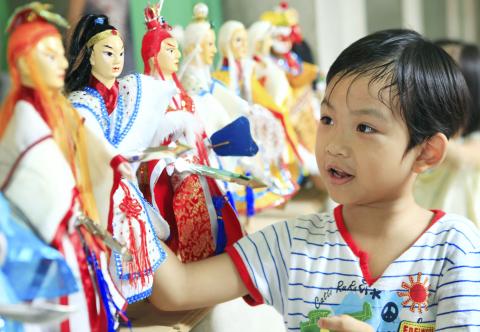Since 1999, Huwei (虎尾) has been home to the Yunlin International Puppet Theater Festival (雲林國際偶戲節), the only event in the county listed in the Time for Taiwan calendar (台灣觀光年曆) for national tourism events.
Highlights of this year’s festival, which opens tonight, include industry celebrities as well as new puppeteers to the trade.
The program lists stars like Chen Han-chung (陳漢忠) of Ah-Chung Glove Puppetry (阿忠布袋戲), Wang Ying-chieh (王英潔) of the Taichung Puppet Theater (台中木偶劇團) and folk singer Lee E-jun (李翊君).

Photo Courtesy of Yunlin County Cultural Affairs Department
Four newly licensed puppeteers from Yunlin Second Prison’s (雲林第二監獄) are also expected to make their debut.
Taught by the Ming-Shi-Jie Hand Puppet Troupe (明世界掌中劇團) of Changhua County, the four prison inmates obtained their street-performing licenses earlier this year in a new rehabilitation project by the Agency of Corrections.
“These are the first licensed performers and it’s their first time performing outside the prison,” said festival coordinator Chang Chia-hao (張佳皓) of the Yunlin County Cultural Affairs Department.

Photo Courtesy of Yunlin County Cultural Affairs Department
Their one-hour drama, titled The New Three Kingdoms — Cross the Barriers (新三國─過五關), will blend traditional puppetry with lion dance and drumming, Chang said.
Other scene newcomers are brought to the festival by a national apprenticeship program aimed at preserving the craft and developing talent. This year, 20 master artists trained fledgling puppeteers at 51 locations across Taiwan.
Throughout the festival, school and community clubs will stage 65 shows based on classics, fables and local stories. They are eligible for prizes at the Golden Palm Awards (偶戲金掌獎), which recognizes productions for best narration, teamwork, original script, puppetry technique, sound, visuals and other categories.
Shows by Taiwanese troupes are free and shows by international companies are NT$100 per performance, Chang said.
The festival program includes 32 shows by troupes from the US, Japan, the Philippines, Russia and other countries.
From Japan, Takenoko-kai brings an ancient form of marionette that uses the teita, a wooden board, to control the expressions and movements of puppets.
Roppets Edutainment Productions, winner of the Outstanding Educational Entertainment award by Who’s Who in the Philippines, offers colorful child-friendly programs with innovative special effects.
The Yunlin International Puppet Theater Festival opens tonight and runs to Oct. 12 with puppet productions, exhibitions, cosplay shows, workshops and other activities. Shows are in Chinese, Hakka, Hokkien, English, Japanese or other languages, with no subtitles. For a full list of events, visit www.2014yunlin-puppet.tw.

It’s a good thing that 2025 is over. Yes, I fully expect we will look back on the year with nostalgia, once we have experienced this year and 2027. Traditionally at New Years much discourse is devoted to discussing what happened the previous year. Let’s have a look at what didn’t happen. Many bad things did not happen. The People’s Republic of China (PRC) did not attack Taiwan. We didn’t have a massive, destructive earthquake or drought. We didn’t have a major human pandemic. No widespread unemployment or other destructive social events. Nothing serious was done about Taiwan’s swelling birth rate catastrophe.

Words of the Year are not just interesting, they are telling. They are language and attitude barometers that measure what a country sees as important. The trending vocabulary around AI last year reveals a stark divergence in what each society notices and responds to the technological shift. For the Anglosphere it’s fatigue. For China it’s ambition. For Taiwan, it’s pragmatic vigilance. In Taiwan’s annual “representative character” vote, “recall” (罷) took the top spot with over 15,000 votes, followed closely by “scam” (詐). While “recall” speaks to the island’s partisan deadlock — a year defined by legislative recall campaigns and a public exhausted

In the 2010s, the Communist Party of China (CCP) began cracking down on Christian churches. Media reports said at the time that various versions of Protestant Christianity were likely the fastest growing religions in the People’s Republic of China (PRC). The crackdown was part of a campaign that in turn was part of a larger movement to bring religion under party control. For the Protestant churches, “the government’s aim has been to force all churches into the state-controlled organization,” according to a 2023 article in Christianity Today. That piece was centered on Wang Yi (王怡), the fiery, charismatic pastor of the

Hsu Pu-liao (許不了) never lived to see the premiere of his most successful film, The Clown and the Swan (小丑與天鵝, 1985). The movie, which starred Hsu, the “Taiwanese Charlie Chaplin,” outgrossed Jackie Chan’s Heart of Dragon (龍的心), earning NT$9.2 million at the local box office. Forty years after its premiere, the film has become the Taiwan Film and Audiovisual Institute’s (TFAI) 100th restoration. “It is the only one of Hsu’s films whose original negative survived,” says director Kevin Chu (朱延平), one of Taiwan’s most commercially successful